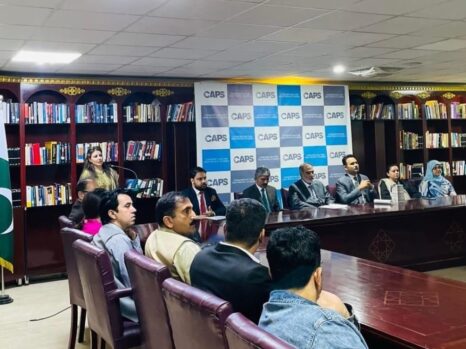LONDON: In response to concerns raised by British MPs regarding the imprisonment of incarcerated former prime minister Imran Khan, UK Foreign Secretary David Lammy in a letter to a Labour MP issued a detailed statement, saying there is “no indication” that Mr Khan will be tried in military courts.
The letter was made public by PTI’s Syed Zulfi Bukhari on Saturday, who hailed the development and told Dawn that Mr Lammy’s response signalled the UK government’s values that “any valid democracy cannot have military courts”.
In the one-page letter dated Nov 11, the foreign secretary addressed Labour MP Kim Johnson of Liverpool Riverside, saying: “While Pakistan’s judicial processes are a domestic matter, we have been very clear that the Pakistani authorities need to act in line with their international obligations and with respect for fundamental freedoms, including the right to a fair trial, due process and humane detention.”
Mr Lammy added: “This applies to Imran Khan as it does to all Pakistan’s citizens.” He also expressed concern over restrictions on freedoms in Pakistan, emphasising the importance of democratic principles and the rule of law and also said the UK continues to engage at senior levels with the Pakistan government on such critical matters.
The development comes as a major victory for the PTI, which has been intensifying efforts in recent months to bring attention to Mr Khan’s incarceration through coverage in major international publications as well as in discussions with British parliamentarians.
A group of 20 MPs from across party lines had recently urged Mr Lammy to push for the release of Mr Khan, calling his detention “politically motivated”. The MPs had expressed fears that Mr Khan might face trial in military courts, labelling such a move as an “unlawful escalation”.
Mr Lammy addressed these concerns in his letter, stating: “I have raised concerns about the potential use of military courts to try civilians, including Imran Khan. Such courts can lack transparency and independent scrutiny, making it difficult to assess compliance with international standards. We have no recent indications from the Pakistani authorities that they intend to try Imran Khan in a military court, but my officials continue to monitor the situation closely.”
Beyond judicial concerns, Mr Lammy highlighted broader issues of civil liberties and democratic values in Pakistan. “Like you, I remain concerned by restrictions on freedom of expression and assembly, including in relation to the political opposition. In our engagements with the authorities, we continue to underline that the freedom to hold and express views without censorship, intimidation, or unnecessary restriction is a cornerstone of democracy,” he said.
The letter also referenced the ongoing discussions between UK and Pakistani officials. The foreign secretary noted that the UK minister responsible for Pakistan, Minister Falconer, had emphasised the importance of political rights and civil liberties in conversations with Pakistan’s Human Rights Minister Azam Nazeer Tarar.
Minister Falconer is due to visit Pakistan later this year, with plans to meet key stakeholders and discuss these pressing issues.
Mr Lammy further acknowledged recent constitutional amendments passed by Pakistan’s parliament, underlining the importance of an independent judiciary to maintain democratic balance. “While any amendment to Pakistan’s constitution is a matter for Pakistan, we have been clear that an independent judiciary, able to check and balance other state organs, is critical to a functioning democracy,” he noted.
‘Letter will annoy authorities’
Speaking to Dawn, both serving and retired diplomats said the UK government’s response is likely to be closely watched in Pakistan, as questions about judicial independence, civil liberties and political fairness have come under the spotlight.
“One must distinguish between a political statement and a policy statement. This is not a policy statement which may have consequences in terms of action. But it does reveal the internal thinking of the UK on the ongoing situation in Pakistan,” former ambassador Touqueer Hussain said.
One retired diplomat on condition of anonymity said the letter would irk Pakistani authorities, adding: “It would definitely annoy the authorities. The content of the letter is quite substantive; it is not a perfunctory letter saying ‘we will look into it’ — it is addressing every aspect of what is happening. It reflects the thinking of the British government therefore it is significant.”
The diplomat also said that while the PTI has been successful in lobbying the international community to get attention on the issue of Imran Khan, it is not the only party to have done so as the MQM has done the same in the US in the past, as has the PPP during the eras of Pervez Musharraf and Ziaul Haq.
A serving diplomat, requesting anonymity, said: “The substance of it in terms of fundamental freedoms and their sanctity in the constitution and its implementation is what the UK absolutely upholds and has called for on a number of occasions.
“However foreign authorities must remain mindful of Pakistan’s sovereignty in their bilateral discussions and not be involved in our domestic matters.”














